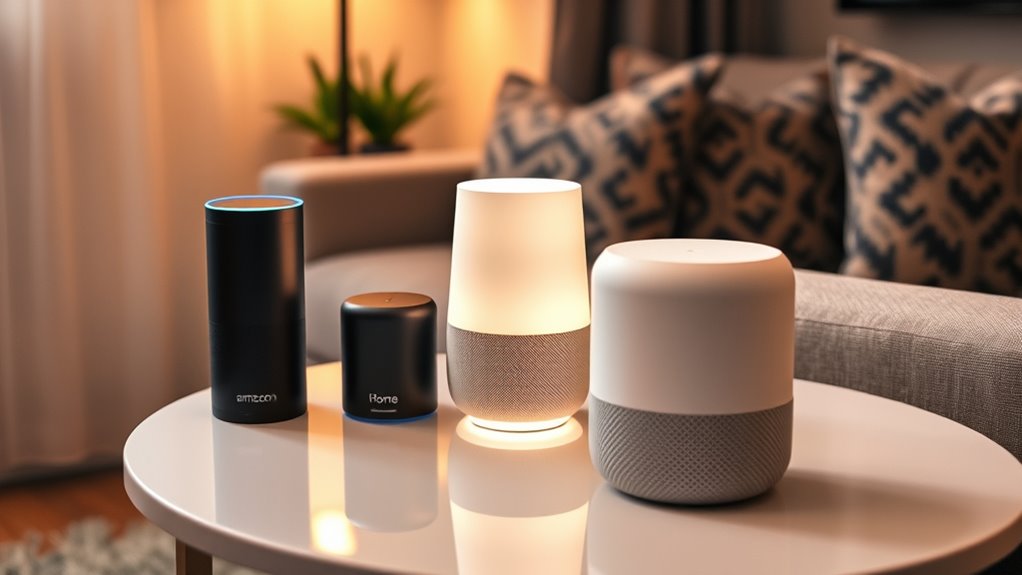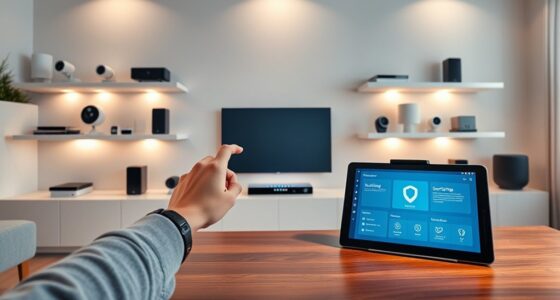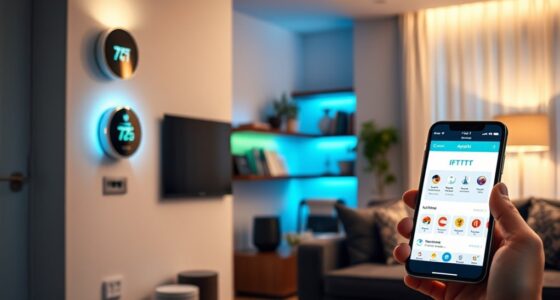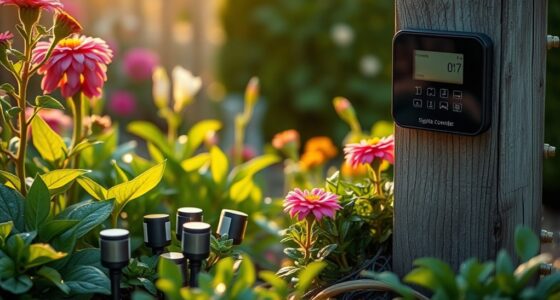If you’re looking for the best smart speaker for a small apartment, consider your ecosystem needs and sound preferences. The Echo Dot or Google Nest Mini are compact, budget-friendly options that work well with Alexa or Google Assistant. The Apple HomePod Mini offers seamless integration and privacy-focused features but is slightly pricier. Sonos One or Era 300 deliver superior sound, perfect for immersive experiences. Keep exploring to find the ideal device that fits your lifestyle and space.
Key Takeaways
- Alexa offers extensive device compatibility and smart home skills, ideal for versatile automation in small apartments.
- Google Home provides faster responses and seamless integration with Google services, enhancing daily routines.
- Apple HomePod Mini excels in privacy, sleek design, and seamless integration with Apple ecosystem, suitable for privacy-conscious users.
- All three options have compact, space-efficient designs, but pricing varies from budget-friendly to premium.
- Sound quality varies by model; Sonos and Echo Studio deliver immersive audio, while HomePod Mini offers optimized sound for small spaces.
Comparing Ecosystem Compatibility and Smart Home Integration
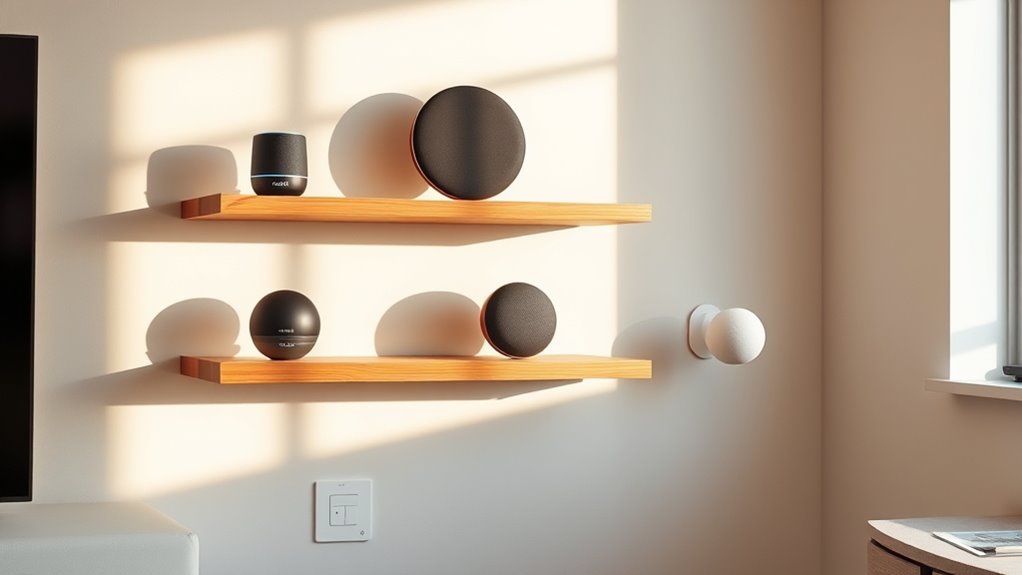
When choosing a smart speaker for a small apartment, ecosystem compatibility plays a crucial role in how well your device integrates with other smart home products. Your choice impacts smart home integration, device compatibility, and automation.
Ecosystem compatibility is key for seamless smart home integration in small apartments.
If you prefer Alexa, devices like the Echo Dot support over 140,000 smart devices, making them highly versatile for broad smart home ecosystems. Additionally, Alexa’s open platform facilitates integration with various third-party products, enabling greater customization and control. Many users value the compatibility advantages that come with Alexa, especially when expanding their smart home setup.
Google Assistant, found in Google Home speakers, excels at integrating with Google services like Calendar, Maps, and Chromecast, providing seamless automation. Its strong compatibility with Google’s ecosystem makes it an ideal choice for users already invested in those services.
The HomePod Mini is optimized for Apple’s HomeKit, but it’s limited to Apple-compatible devices and requires an iOS device for setup. This ecosystem restriction can influence your decision based on your existing device lineup.
Sonos One supports both Alexa and Google Assistant, offering flexible ecosystem options. This dual compatibility allows users to choose or switch between voice assistants without sacrificing smart device integration.
Your decision should align with your preferred voice assistant and existing smart home ecosystem for optimal compatibility. Considering cultural intelligence and the flexibility of your plan can help ensure your retirement investments remain secure and adaptable over time.
Assessing Sound Quality and Room-Filling Performance
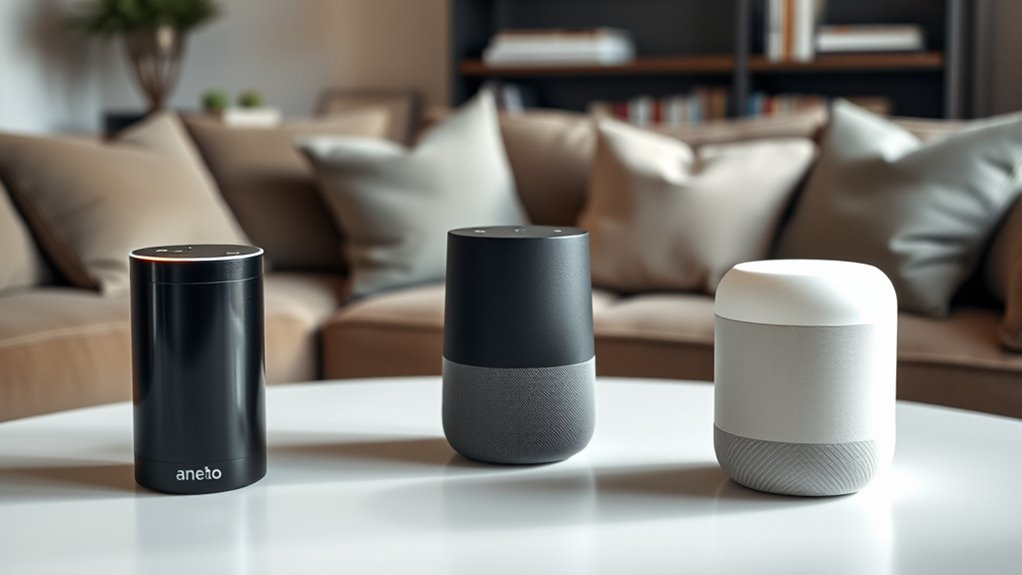
Sound quality and room-filling performance are key considerations when selecting a smart speaker for a small apartment. These devices vary in their ability to produce immersive sound, with features like spatial audio and advanced acoustics enhancing the experience. For example:
| Speaker Model | Sound Features | Room-Filling Performance |
|---|---|---|
| Amazon Echo Studio | 360-degree sound, rich bass | Large, immersive sound with noise cancellation |
| Sonos Era 300 | Dolby Atmos, six drivers | Deep, spatial audio ideal for small spaces |
| Apple HomePod 2nd | Spatial audio, deep bass | Clear, balanced sound with small room sound optimization |
Expect high voice clarity and superior audio performance, making these smart speakers perfect for small apartments where sound quality matters.
Evaluating Voice Recognition and Response Speed
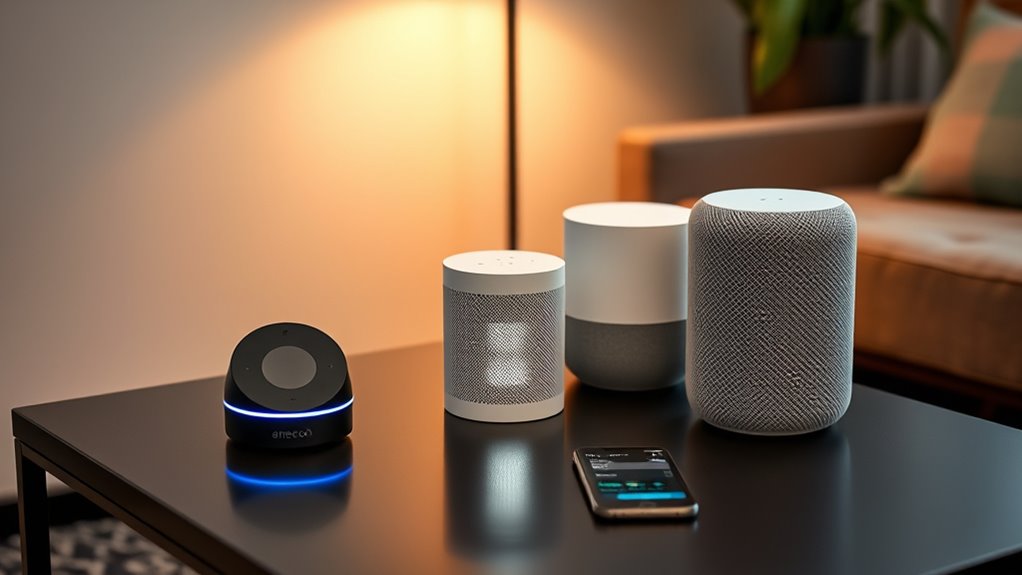
Choosing a smart speaker for your small apartment means considering how quickly it recognizes your voice and responds to commands. Voice recognition and response speed are key factors in this decision. Smart speakers like Amazon Alexa typically respond within 1-2 seconds, though response time can vary based on network conditions and device processing speed. Processing algorithms significantly influence how fast your device can interpret commands and act accordingly. Additionally, the hardware capabilities of the device can impact its overall responsiveness and accuracy. The software optimization of the device also plays a crucial role in ensuring quick and accurate responses. Google Assistant often offers faster responses, usually under 1 second, thanks to Google’s optimized algorithms. Meanwhile, Siri on the HomePod Mini tends to have slower response times, averaging around 2-3 seconds due to privacy-focused processing. Faster response speed enhances your experience by making interactions feel more natural and seamless. Additionally, the technology behind voice processing plays a significant role in how quickly your smart speaker can identify commands and deliver responses. The network connection quality can also impact response times, especially during high traffic or weak Wi-Fi signals, so choose a smart speaker that balances quick voice recognition with reliable response speed for your smart home devices.
Considering Design, Size, and Space Efficiency
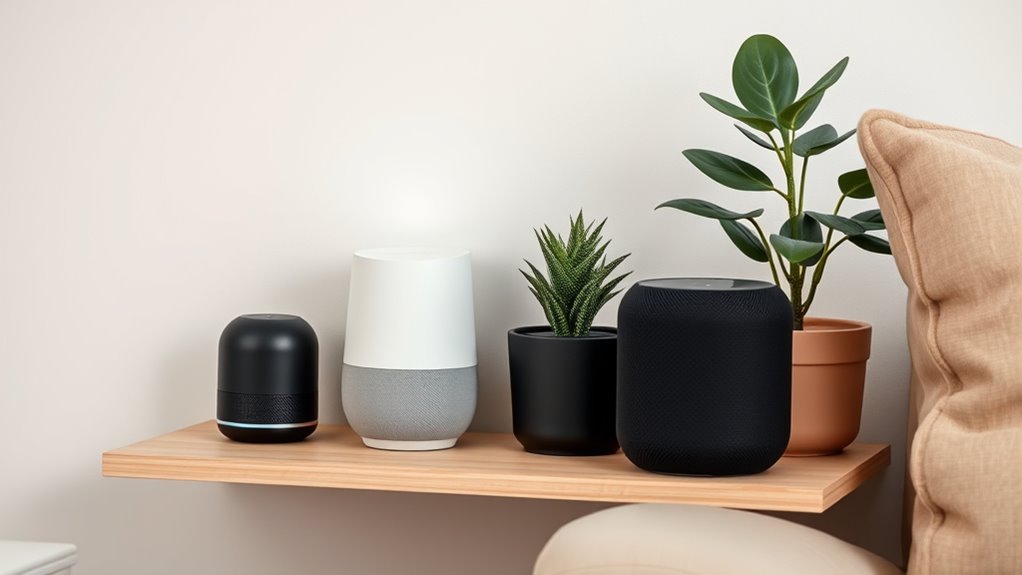
Selecting a smart speaker that fits seamlessly into your small apartment involves more than just voice recognition speed. You need a device with a compact design and small footprint that maximizes space efficiency. Mini smart speakers like the Amazon Echo Dot or Google Nest Mini offer a space-saving, unobtrusive form factor, making them perfect for small spaces. Their sleek look and small size allow for discreet placement on bedside tables, shelves, or counters. The Apple HomePod Mini, with its spherical, stylish design, combines elegance with a small footprint, blending into your decor. These portable smart devices are designed for small spaces, providing effective performance without cluttering your environment. Additionally, their diverse designs and materials ensure you can find a style that complements your interior. To further optimize limited areas, consider choosing models with multi-functionality, which can serve additional purposes such as speakers or smart home hubs. Incorporating a compact smart speaker can improve both functionality and aesthetics in your living space. Moreover, selecting a space-efficient device can help maintain an uncluttered look in your apartment. Overall, their space-saving features make them ideal for unobtrusive, functional smart home setups in limited areas. A well-chosen small speaker can also enhance room aesthetics and contribute to a cohesive interior design.
Exploring Device Options and Price Points
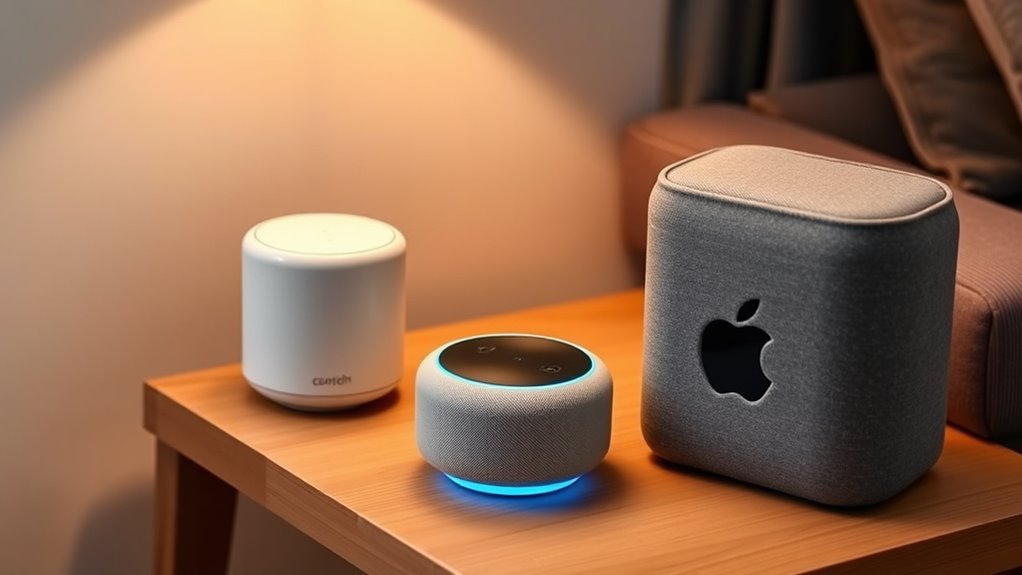
When it comes to small apartments, your budget and desired features play a crucial role in narrowing down smart speaker options.
The Echo Dot offers a budget smart speaker choice, typically priced around $50–$70, with a compact design and rich features.
The Google Nest Mini, also around $50, provides strong Google Assistant integration and a small footprint ideal for limited spaces.
If you prefer seamless Apple ecosystem integration and high-quality audio, the Apple HomePod Mini costs about $99.
For those seeking premium sound and smart home features, Sonos offers high-end options like the Era 100 at $249.
Price ranges vary from under $50 to nearly $300, giving you flexible options to balance affordability and performance in your small apartment.
Analyzing Multiroom Audio and Connectivity Features
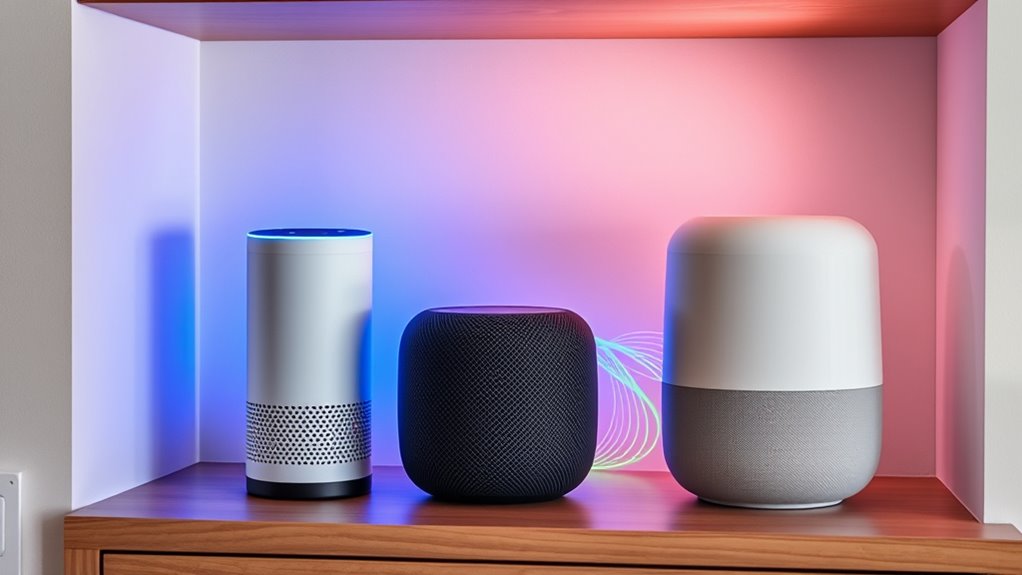
Many smart speakers support multiroom audio and connectivity features that can enhance your small apartment’s sound experience. With multiroom audio, you can sync playback across multiple devices for seamless sound throughout your space. Amazon Alexa makes this simple by grouping Echo speakers via the Alexa app, enabling synchronized streaming. Google Home offers similar functionality through speaker groups in the Google Home app, supporting Chromecast-enabled devices for multiroom audio. Apple HomePod uses AirPlay 2 to connect multiple speakers, delivering high-quality synchronization within the Apple ecosystem. Connectivity options like Bluetooth pairing on devices such as the Sonos Roam or Bose Portable allow offline multi-device sharing. Additionally, payment security features ensure that your connected devices maintain safe and secure communications, especially as smart home ecosystems become more integrated. As device interoperability continues to evolve, choosing a platform that supports multi-device connectivity can significantly enhance your overall experience. Your choice impacts ease of setup and compatibility, with each platform integrating with various streaming services and third-party devices for a tailored smart home experience. Incorporating wireless network stability is also crucial for uninterrupted multiroom audio performance, ensuring a consistent listening experience throughout your apartment.
Matching Features to Lifestyle and Household Needs
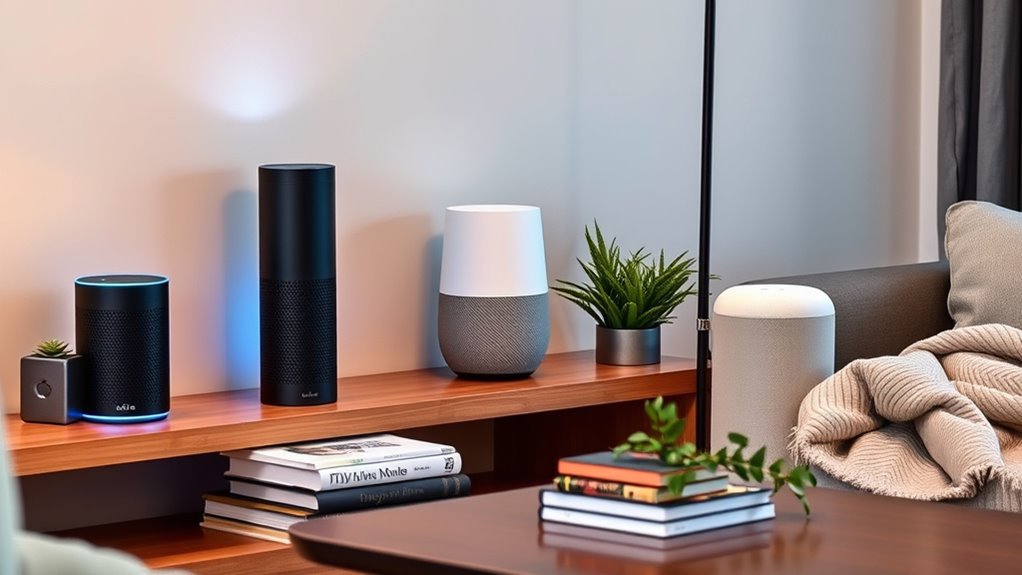
Choosing the right smart speaker depends on your lifestyle and household needs, as each platform offers unique features that cater to different preferences. If privacy and seamless device integration are priorities, the Apple HomePod Mini with Siri excels, offering high sound quality and an integrated ecosystem. For extensive smart home compatibility and smart features, Alexa devices like the Echo provide broad skill support and device compatibility. Google Home speakers shine in natural language understanding and integration with Google services, perfect for routines and calendars. Additionally, understanding the security protocols of each device can help you make an informed decision. Considering the compatibility with existing devices in your home can further enhance your smart setup. Being aware of privacy policies associated with each platform can also help protect your personal information. Being mindful of data collection practices is essential to maintain your privacy while using these smart devices.
Frequently Asked Questions
Which Is Better, Amazon Alexa or Apple Homepod?
When choosing between Amazon Alexa and Apple HomePod, you want to think about your needs.
If you prioritize smart home integration, customization, and affordability, Alexa’s your best bet. It’s faster, more versatile, and works with many third-party devices.
But if you’re deeply embedded in the Apple ecosystem and crave premium sound quality, the HomePod offers seamless integration and better audio.
Your choice depends on whether smart features or audio quality matter most to you.
What Is the Best Mini Smart Speaker?
Imagine a tiny command center at your fingertips—this is your mini smart speaker. If you value seamless Apple integration and rich sound, the HomePod Mini shines.
For affordability and reliable voice control, the Echo Dot is a strong contender.
Meanwhile, the Google Nest Mini offers compact size and excellent voice recognition.
Your best choice depends on your ecosystem and budget, but all fit perfectly into your small space.
Which Is Better, Apple Homepod or Amazon Echo Studio?
Between the Apple HomePod and Amazon Echo Studio, the choice depends on your needs.
If you prioritize superior sound quality and seamless Apple ecosystem integration, the HomePod is your best pick.
However, if you want louder, room-filling sound with more voice assistant options and budget-friendly pricing, the Echo Studio suits you better.
Consider your space size and preferred ecosystem to decide which speaker aligns with your lifestyle.
Which Is Better, Alexa or Google Home or Siri?
Choosing between Alexa, Google Home, or Siri is like picking the right tool for a specific job. If you want broad device compatibility and customization, Alexa’s your best bet.
For smarter search and natural conversations, Google Home excels.
If privacy and seamless Apple integration matter most, Siri is ideal.
Consider your existing devices and priorities to make the best choice, as each voice assistant offers unique strengths suited to different needs.
Conclusion
Choosing the right smart speaker is like selecting a loyal companion—each has its own voice and rhythm, shaping your daily symphony. Whether you prefer Alexa’s versatility, Google’s intuitive mind, or Apple’s seamless harmony, your choice reflects your unique rhythm in this interconnected dance. Ultimately, your ideal speaker becomes a beacon, guiding your small apartment’s energy and ambiance—turning technology into a trusted partner that resonates with your lifestyle’s true melody.
